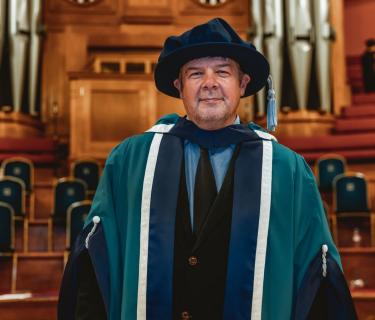When Explorer Mark Wood was awarded one of Arden’s Honorary Doctorates last November, he spoke about the power education has in changing lives and helping people reach their true potential.
Mark, a distinguished speaker, author, and educator, uses his experience from his expeditions to educate and motivate others, tapping into the similarities between organisations today and the dangerous and hostile conditions faced by explorers.
Having completed more than 30 major expeditions around the world, taking on the toughest climates in the process, Mark has ventured out as far as the magnetic, geomagnetic, and geographic North Poles.
But despite his confidence facing challenging environments, Wood is no stranger to self-doubt. We spoke to him recently about overcoming your inner critic.
Let your ideas inspire you
One way that Mark tackles self-doubt is by allowing ideas to inspire him.
‘For my next expedition, I came up with the concept of spending 100 days alone in the Arctic – with no outside support.’
‘At first, it seems completely ridiculous, but I have that seed of inspiration inside me. I’ve got that feeling of adventure again.’
When he’s had that initial idea, Mark stops for a second – giving him time to process his next steps.
‘I learned a lot from the Inuit guys and my Nepalese friends. When you ask them a question, they’ll pause and look at you. You can be tricked into thinking it's ignorance. But what they’re actually doing is thinking before they answer.’
‘I’ll write down my idea on the wall, then I’ll walk my dogs and get some clarity. Then, when I come back, I look at that idea with a clear perspective. At that moment, I know whether I can do it or not.’
Your idea might be about changing career, running your own business, or simply returning to education. Allowing your idea to inspire you, and remembering that feeling of excitement, is a great way to help you overcome your inner critic later in the journey.
Getting to the top isn’t always the most important thing
When you start anything it’s natural to have high expectations. But one of Mark’s expeditions shows that getting the best marks, or earning the most money, isn’t always the most important metric for judging success.
'So, we were approaching the top of Mount Everest. It was -45 C, 40 mph winds, and it’s dark. We were about 200 metres from the summit, we’d spent 72 days on the mountain, and I actually felt quite good.'
'At that point though, one guy on our team dropped to his knees and, in short, he started to die. I turned around to the next guy who was a doctor. And the guy said “My feet are frozen, I need to head down the mountain.” So, I was left alone, on the side of Mount Everest, with no other teams around, with two people potentially dying – with the summit of Everest in view.'
'The decision I made then was very quick and it wasn’t about being an egotistical explorer, it was about being human. We picked the guy up and we aborted the expedition. I mean, after 72 days, that is a tough thing to do. But we took him down to camp and kept him alive. For the next three days, I traversed him back to base camp and everybody on the Expedition survived.'
'We didn't reach the summit. But the 10,000 Kids around the world following the expedition learned more from that one single moment of leadership than they would have done from me waving a flag on the summit of Everest.'
Sometimes the experience and lessons you get across your journey, are worth more than the end goal. If you find your inner critic is telling you that you won’t be able to do something, even telling them to be quiet and starting your journey is something to be celebrated.
Be honest about who you are
Honesty is an important tool for taking on imposter syndrome and overcoming your inner critic.
‘I was asked to make a speech to a room of academics studying climate science,’ says Mark ‘As I looked down the line, I thought “I'm so out of place here.”'
‘But, when I stood up behind the plinth, I did it with honesty. I said “I'm not a scientist. I'm not from a science background, but I work with scientists to collect data that they or satellites can't collect, and my opinion is from ground level, talking about the Inuit people, the environment that I see, you know, from a very personal perspective.”’
‘If I’d started trying to trick them, I would have lost them.’
Being honest with yourself is an easy way to build confidence in your ideas, as well helping you become the kind of person you would like to be. It becomes much more difficult to achieve anything when you’re pretending to be something you’re not.
Don’t be afraid to ask for help
When you think of explorers in popular culture they tend to be “Me against the World” types. Victorian gentlemen with thick moustaches hacking through the rainforest, Grizzly men with crampons and pickaxes scaling a vertical face of a freezing cold mountain and eccentric individuals, locked in one-on-one battles with their environment.
So, perhaps somewhat surprisingly, Mark is keen to stress how important it is to not be afraid to ask for help.
'No matter how much I've done, I always ask questions of people who have been in the game a long time about things like equipment. Sometimes it makes me look like I don’t know what I’m doing, but I’m not embarrassed to ask because I don't want to be in a position where I make a fatal mistake.'
Knowing your limits is vitally important to the success of any expedition. In arctic conditions, pushing too far into your redzone can endanger the entire group, especially when you’re contending with constant sun-blindness and hidden crevasses, one misstep can mean danger.
'Something that surprises everybody about polar exploration is that the biggest killer is overheating,' Mark says.
'You think it'd be something like the polar bears, strong winds, open water or the usual suspects you find in book, but actually, as the sun reflects against the ice, it creates heat,'
'As you're moving along, in minus 35, minus 40 degrees, working like a shire horse pulling sledges and equipment, you're creating heat with your body.'
'But, when you stop, you drop back down to minus 35. If you've been sweating, that liquid on your body will turn to ice, which can calm down your heart and your lungs and can give you hypothermia.'
'As a leader, you want your team to have constant movement, but you have to make sure they're not pushing too hard. If someone asks for help, you have to listen to them.'
When studying, it may feel like you’re pushing a heavy sledge on your own, but at Arden, there’s a host of services available to students to help them lighten the load. Whether that’s careers, financial, or for help with your academic skills, the help is there to help you keep moving and silence your inner critic.
Find Reasons to keep going, not excuses to quit
Despite being incredibly proud of what he does, when he’s out on the Ice Mark still has to struggle against his inner critic telling him to pack up and give up.
'On Ice, you know your enemy. Sure, there’s the winds, the environment, and the animals, but the biggest threat is your mind. I’ll be pulling your sled and start to think: I spent three years trying to get the money to do this, but why the hell am I doing this?'
'There are many periods of time, usually right at the very start, where you're looking for every conceivable reason to give in. You’ll think about how your ski bindings might be breaking, or your ankle straps don’t fit. You look for a failure and an opportunity to give in.'
Like many people, Mark can find him being attacked by intrusive thoughts telling him to give up. Even if you start studying, you might start to think you’re too busy juggling work and family responsibilities to actually finish the course – looking for a reason to give up and drop out.
But if you take a second, to think about why you wanted to study in the first place, the benefits and satisfaction the qualification can lead to, you’ll remind yourself of what it’s all for.
Starting anything, especially something like a degree that can take several years, can feel like a massive undertaking. But remember, you don’t have to do it all in one go. Break it down, lesson-by-lesson and day-by-day.
'The simplicity of what I do is that you just put one foot in front of the other in the right direction and that's progress,' says Mark. 'When you go out onto the ice you don’t think of getting to the North Pole or the South Pole. For that day, you think about your footprints.'
Silence your own critic with a degree from Arden University. Visit our course pages to start exploring your dream career today.





